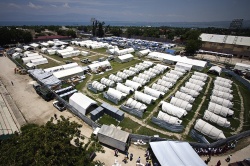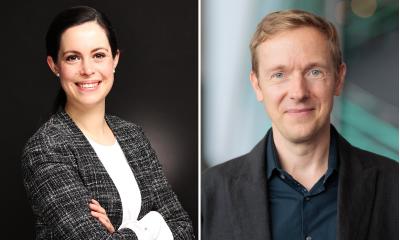Disaster medicine is not for perfectionists
The Ebola epidemic in West Africa, war in Syria, typhoon in the Philippines – over and over, German doctors are among those deployed to help. We interviewed Dr Johannes Schad, Medical Director of the Foundation of the German Institute for Disaster Medicine, about his direct experiences on the ground at the worst of times.
Interview: Sascha Keutel


When did the description emergency change to disaster medicine?
‘In Germany, only a chief councillor or mayor can formally declare that an incident is a disaster – by no means can a senior emergency physician do this. Therefore, for financial reasons (costs are borne by the district or city) the term ‘major catastrophic event’ is also often used.
‘Essentially, when a medical disaster occurs you are dealing with a massive imbalance between the resources available and those actually required. This means that the optimal and excellent individual medical care normally expected for patients can no longer be guaranteed. The applicable medical treatment motto becomes ‘do the best for the most’.
‘Emergency medicine is the “natural sister” of disaster medicine.
‘The objective of disaster medicine is to ‘cease to exist’, that is to ensure a return to the norm whereby optimal individual medical care can be provided to everyone.
'Unfortunately, as emergency medics, we tend to be geared towards the provision of individual emergency care to such an extent that we sometimes forget to “flick the switch” in the respective situation and to carry out a strategic and systematic initial analysis. Basically, we automatically do what we have learned, are capable of and know.’
What are the greatest challenges in disasters?
‘The biggest problem in emergencies is communication, the confusion arising from this and the lack of information. Coordination is another weak point during what we refer to as the ‘chaos phase’. This concerns technical aspects such as an overload of the mobile communications networks as well as the responsible control rooms. Essentially, it’s important that the command team carries out a confidential, honest and self-critical appraisal of a situation. This is the only way to jointly tackle this type of challenge. Furthermore, (self)-admission of a lack of knowledge is also important.’
Which concrete tasks must be tackled in a disaster?
‘Disaster medicine includes aspects of decontamination, hospital alert planning, transport logistics, biological and chemical damage assessment and, lately, also aspects of global threats through viral agents.
‘In a concrete case the initial objective is to obtain information – particularly about the cause – and thus to devise a strategy to prevent secondary damage or cascading effects. Doctors and nurses also need to look after themselves, so that they don’t end up causing additional problems – such as accessing a disaster location in an inappropriate way. ‘Emergency doctors are also responsible for the organisation of central assembly points for treatment sites where triage can be carried out for the injured. The past has shown that there is no point in merely relocating the chaos from the disaster site to the nearest hospital.’
Could work become a daily routine at disaster sites – or are there any routines?
‘The only real opportunity for disaster medicine is in preventative work. Only through practised training can we help to identify and improve existing weaknesses. Israel, to name an exemplary international case, has an excellent system not only for regular, pre-clinical care but also an exemplary relationship between civil protection and security agencies. In Germany, because thankfully we tend to be not as affected, the readiness of the government as well as the special services to deal with this subject is quite assessable.’
Why did you, personally, opt for a career in disaster medicine and what experience have you gained?
‘My decision to work in disaster medicine was based on a mix of idealism and a sense of adventure, combined with scientific curiosity and the realisation that modern disaster medicine in Germany still has a lot of potential for further development. There are only few people who are substantially involved with this subject, and this is obviously not a profitable business.
‘My deployments for the German Red Cross or the International Committee of the Red Cross, among others to Kenya, Gaza, Iraq, the Philippines and Jordan, were very different in each case. The work calls for a lot of flexibility on the part of the task forces, to quickly adapt to the respective, particular environments. There is no general recipe that fits all deployments.
‘The important thing is to provide help to the affected population in the respective country where help is most needed. This can only be determined through an assessment of the situation together with those affected.’
Which deployments are most memorable and how do you deal with the psychological pressure?
‘Without a doubt, the disaster in Haiti in 2010 and the difficulties involved in the provision of acute aid, followed by rebuilding everything, eclipsed a lot of what I had experienced before.
‘This very example illustrates the importance of a political, or stable social, organisational structure. To date, Haiti has still not been able to rid itself of the dilemma of poverty and the associated lack of perspectives. ‘You pepare yourself for that pressure and know that the work has to be carried out under suboptimal conditions, otherwise it would be catastrophic.
‘Being quite a “tough cookie” is definitely not a disadvantage. However, sometimes working in a team, we achieve a level of motivation that’s hard to find in a more regular working environment. This is also not the right working environment for perfectionists because we often just have to find pragmatic solutions. Our local co-workers are frequently our best support because they know exactly what is important.’
Can we in Europe think ourselves safe from large catastrophes?
‘After the Cold War ended, the thinking was that civil protection could be scaled down because of a lack of external threats. Unfortunately, this soon proved a wrong decision. The age of technology brings with it modern vulnerabilities. In particular, we are up against the dependency on electricity, transport routes and cyber-technology. We are hardly armed to deal with this, contrary to all other public statements.
‘In Germany, the implementation and utilisation of the risk-analysis by the Federal Office of Civil Protection and Disaster Assistance (BBK) is called for, which allows for the identification of potential weaknesses on our own doorstep. With insights gained from this, we can try to protect critical infrastructures in such a way that a reasonably safe practice can be ensured.
‘However, there is often a clash between corporate interests and environmental concerns, or traffic management issues. Achieving a balance of interests will continue to be an interesting challenge.’
PROFILE:
Among other disaster operations, surgeon and senior emergency physician Dr Johannes S Schad was operations director for the German Red Cross Field Hospital and worked in the Basic Healthcare Unit in Haiti in 2010. As an International Committee delegate of the Red Cross (ICRC) in Geneva he became an instructor at Shifa Hospital, overseeing the largest emergency admission of patients in the Gaza Strip. In 2011 he taught emergency medicine for the ICRC, presenting three-week-long courses for doctors and nurses in Nadjaf, Iraq and Sulymaniah in Iraqi Kurdistan. Dr Schad is currently studying for a Masters in Disaster Management and Risk Governance at the University of Bonn, a degree course run in partnership with the Federal Office of Civil Protection and Disaster Assistance (BBK).
10.11.2014





